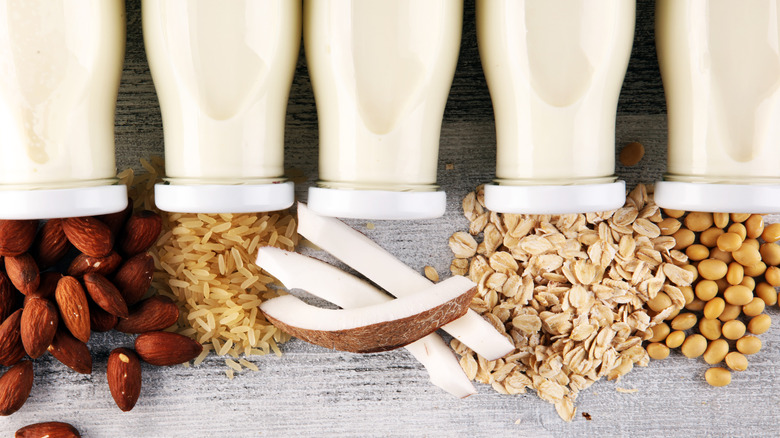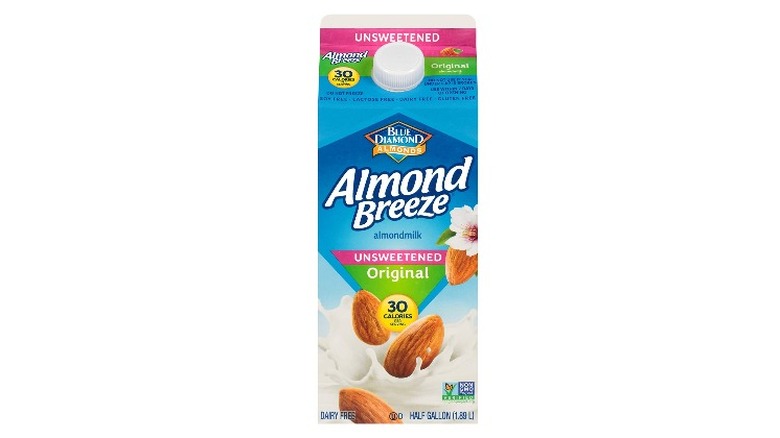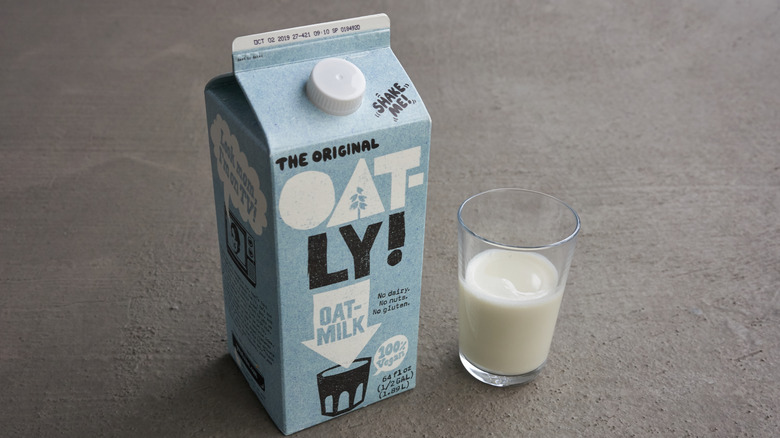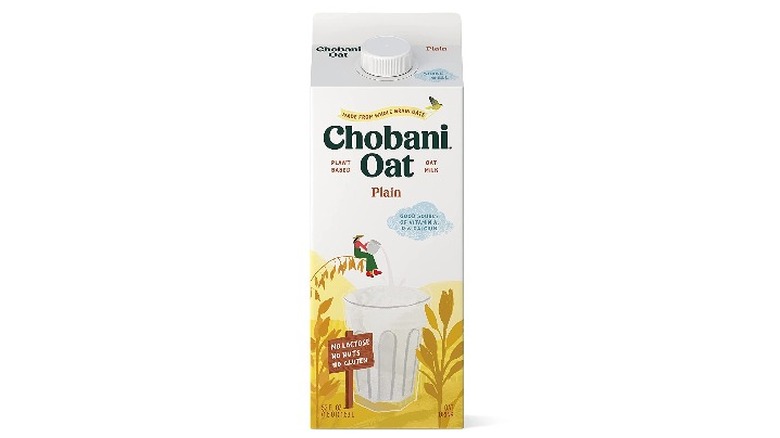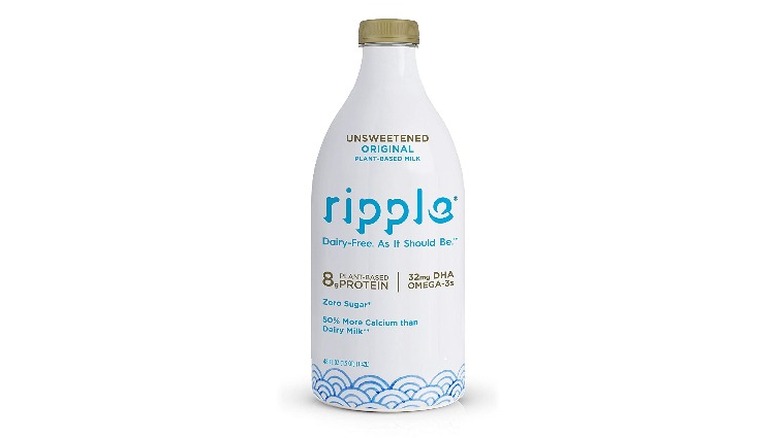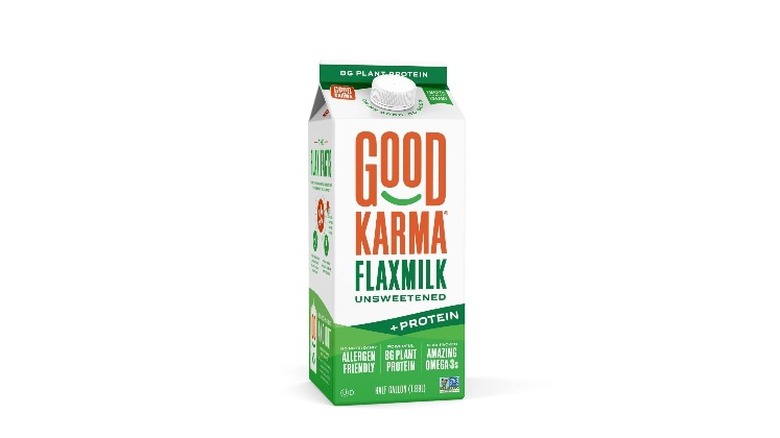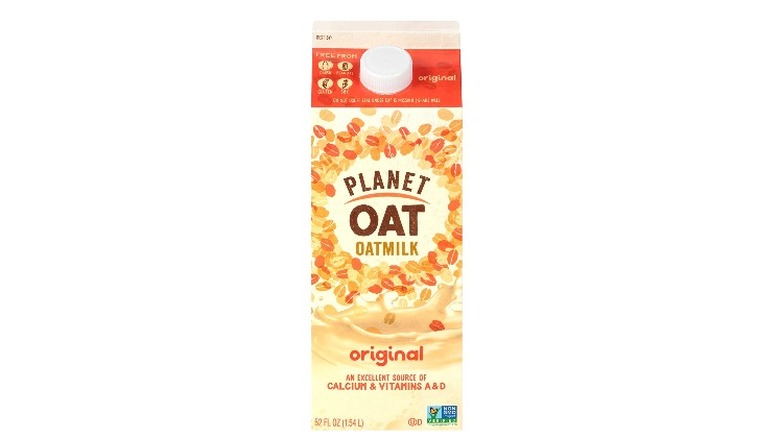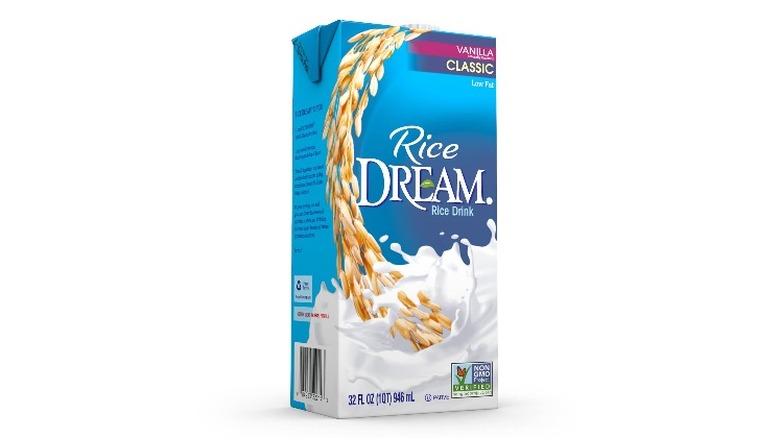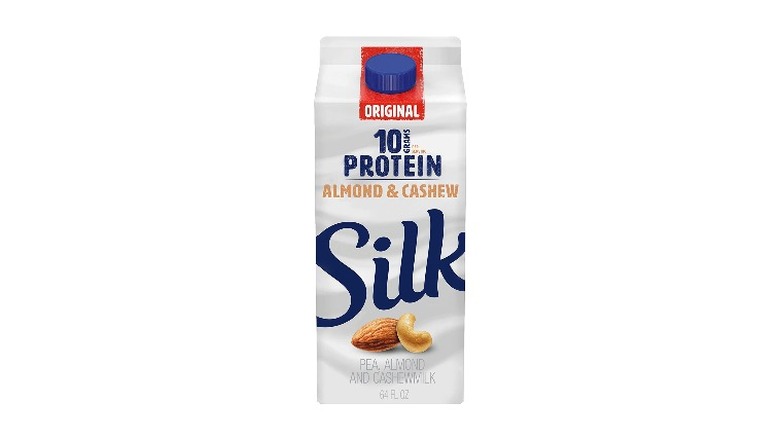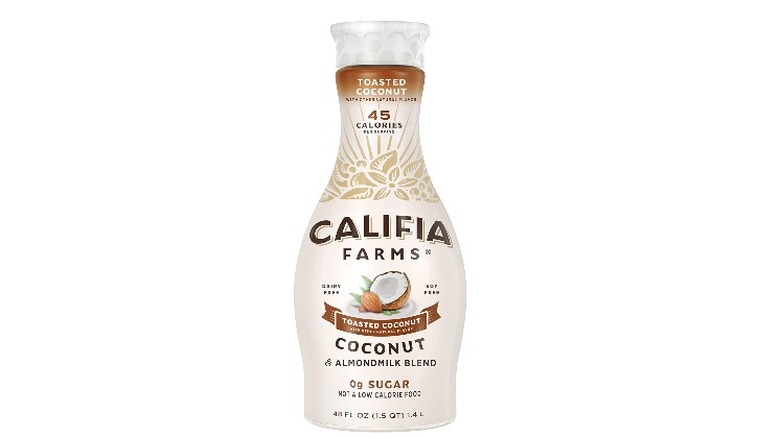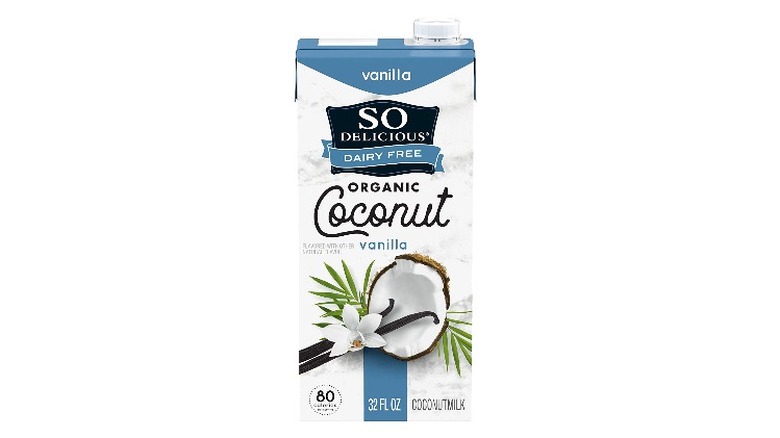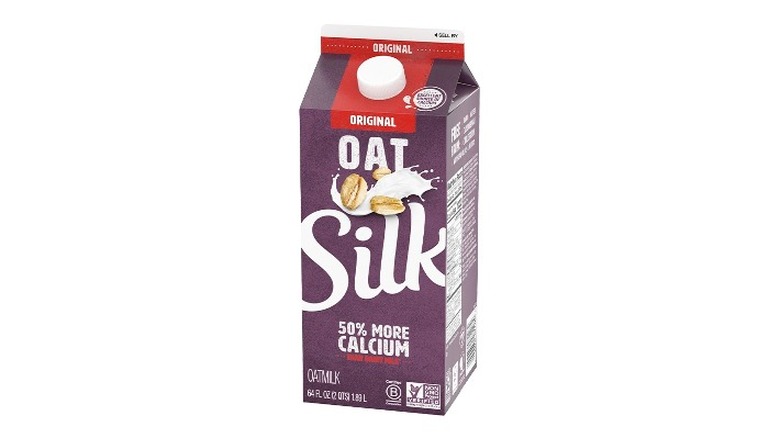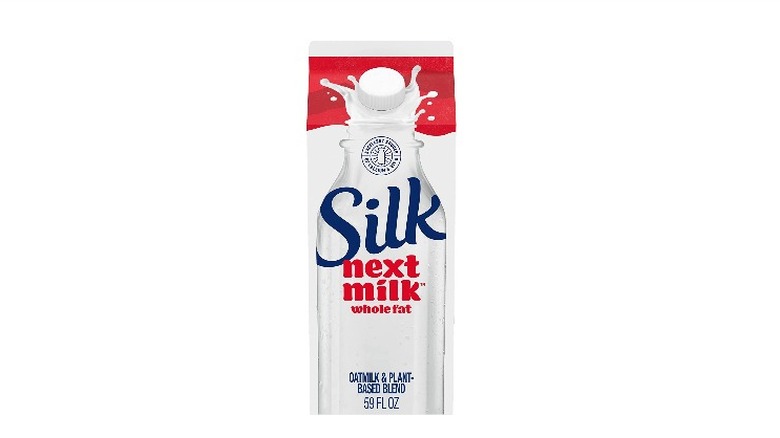Alternative Milk Brands Ranked Worst To Best
We may receive a commission on purchases made from links.
Traditional dairy has met its match in recent years with the accelerating growth of the alternative milk market. It isn't just a passing trend, either. Nowadays, plant-based milk alternatives are part of American households almost as often as cow's milk, with some polling showing that nearly 33% of consumers use alternatives like almond milk on a weekly basis (via Morning Consult). The introduction of plant-based milks in coffee shops like Starbucks and Dunkin', as per Foodbeast, has also helped move the needle, letting consumers sample the goods while getting used to the new tastes and textures available to them.
There are many reasons why cow's milk drinkers may want to shift over to plant-based analogs, according to New Food. Some have made the change for their health, while others cite environmental concerns. By now, the increased demand has generated a great and delicious diversity in the realm of alternative milk. Yet, because of that tasty array of possibilities, choosing the right product can be challenging for the modern shopper. How do you separate the non-dairy cream from the whey when it comes to navigating the new milk market? Here's a rundown of some of the most popular alternative milk brands out there, ranked from worst to best.
12. Almond Breeze
Blue Diamond entered the alternative milk race in 1998, long before many other competitors (via Almond Breeze). Its entry here is a natural fit, considering its 100-year legacy of growing almonds. Likewise, it makes sense that Almond Breeze is a popular and long-lasting selection in the cruelty-free milk fridge. The unsweetened version comes in at just 30 calories per serving, with only two grams of fat. If you were to dream up a dairy-like beverage with as little of the bad stuff and as much of the good stuff as possible, the result would surely look a lot like this.
What pulls Almond Breeze down is its environmental impact. The New York Times has reported that nearly 15 gallons of water are necessary for the production of just 16 almonds. At nearly a gallon per nut, the resources required to support not just the almond industry but the almond milk market is a tax the planet can't afford for long. Blue Diamond is also unclear as to just how it does or doesn't use pesticides on its crops, which may concern some shoppers. Perhaps it's best to let Almond Breeze blow by.
11. Oatly
Oatly proudly displays a glyphosate-free badge on its website. This may not mean much to consumers, but it should. This troublesome pesticide, otherwise known as Round-Up, is a huge obstacle for oat growers, according to Know Your Pantry. Oatly is one of the few brands that goes the extra mile to avoid glyphosates. That alone should be enough to get it a decent ranking. It's also certified vegan, gluten-free, non-GMO, and kosher, providing a feel-good milk alternative that just about everyone can enjoy.
So, what's not to love? The list of chemical additives, for one. Oatly's recipe includes an alphabet soup of ingredients such as dipotassium phosphate, a chemical that helps Oatly blend well in beverages such as coffee. To be fair, it's approved by the European Union and the FDA has deemed the substance "generally regarded as safe."
Yet the fact that the Oatly site provides a disclaimer for medical professionals is potentially concerning. For a company that goes to such lengths to declare its healthful nature, having a disclaimer to justify its use of a chemical may turn off some consumers.
10. Chobani Oat
Another oat-based entry, Chobani Oat marks a departure for the company, known for its traditional dairy Greek yogurt. Adding plant-based options gives it presence in both the standard and the alternative milk markets, a clever move that allows it reach more consumers, no matter their tastes or dietary needs.
Chobani's line of oat milk includes coffee creamers and barista-style milk for at-home java lovers. Whether the brand captures your tastebuds with its cow-based offerings or sways your palate with plant-based possibilities, a glance at the ingredients list suggests that Chobani may not be the most desirable choice. At least, it may not be for anyone who's focused on avoiding as many food additives as possible.
Like many other oat milk options, Chobani's use of dipotassium phosphate clips its nutritional wings. This chemical additive is okay with the FDA, but it's up to consumers to decide how much phosphate they'll accept in their milk alternatives. Considering that there are many other plant-based dairy replacements that don't use dipotassium phosphate, people who want to pronounce all the ingredients on the first try may want to skip this product.
9. Ripple
Ripple touts its creaminess as a key feature, which simply can't be denied. This is nothing less than one of the creamiest dairy substitutes on the market. The secret is sunflower oil and pea protein, a combination that creates a silky-smooth milk with cane sugar sweetness for a vegan-friendly milk experience. The unsweetened version is equally satisfying, great news for drinkers hoping to avoid additional sugars without losing flavor. Ripple also adds calcium, bringing 50% more of the nutrient in a serving than in an equivalent amount of traditional milk, though at 440 milligrams versus the 306 to 325 milligrams in dairy, that claim may require a bit more scrutiny.
The rest of the ingredients list isn't quite so encouraging, however. The inclusion of dipotassium phosphate takes Ripple's goodness down a notch or two, though the nutritional info notes that it makes up less than 1% of a serving. This may or may not be of comfort to health-minded consumers looking to avoid the additive altogether. The use of pea protein can also an issue for anyone with a pea allergy. For the consumer in search of a well-rounded plant milk, the Ripple effect may not be what you're after.
8. Good Karma
Good Karma offers one of the few non-oat/nut/soy plant-based milk options, coming into the market with a flax milk that utilizes pea protein. It's certified vegan, non-GMO, and offers 1200 milligrams of heart-healthy omega-3 fatty acids, thanks to the flax. This sounds like a formula for success for plant-based consumers who need an extra kick of healthful fatty acids and easy-to-calculate protein. Fitness-minded herbivores in the pack may be especially interested.
Good Karma avoids using dipotassium phosphate in its formula, causing some Amazon reviewers to call out the milk's tendency to sink to the bottom of coffee cups. That's tolerable if you're hoping for plant-based milk with as few additives as possible.
But what really causes a problem is the added pea protein. Though it's clearly listed on the container, that same label also boldly states that Good Karma's flax milk is "allergy friendly." That's simply not true for anyone suffering from a pea allergy. If you're clear on what you are and are not allergic to and you don't mind a little separation in your coffee cup, Good Karma is a good call. Otherwise, better options await you.
7. Planet Oat
Planet Oat brings six variations of its oat-based milk to market, with tastes and textures ranging from Extra-Creamy to Dark Chocolate. The latter ramps up the sugar content as you might expect, from a manageable 4 grams per cup in the unsweetened original version to a maybe far-too-generous 12 grams. Not that Planet Oat is passing itself off as a health food; instead, it's billed more as a clean alternative to standard dairy that mindful milk lovers can feel good about drinking. Planet Oat handily lists off the items it's free from, including the now-familiar selection of soy, nuts, and artificial anything.
If one aspect has enough gravity to cause a wobbly orbit, it's Planet Oat's use of dipotassium phosphate, that sticky stabilizer that oat milk brands can't seem to quit. Maybe the company makes up for it in your estimation by supporting a slew of environmental causes, which include everything from tree planting to animal rehabilitation. Of course, those causes are all worthy of time, attention, and investment. If only Planet Oat could figure out a workaround for that additive in its formula, it might just rule the alternate milk galaxy. Or should we call it the plant-based Milky Way?
6. Rice Dream
Rice Dream's ingredients are about as straightforward as it gets: water, organic brown rice, organic sunflower, safflower, and/or canola oil, and sea salt. It's kind of like the Grandma's recipe of alternative milks, if Grandma knew the secrets of making milk out of plants ... and maybe she did. Being an early member of the plant-based milk niche in U.S. grocery stores has reaped Rice Dream some serious sustainability in a sector growing by leaps and bounds.
So what can be said about one of the true original alternative milks? Rice Dream is one of the least milk-like plant-based milks around, something Amazon reviewers who love Rice Dream are quick to point out. While other alternative milks are clamoring to stand in for authentic cow-based dairy, Rice Dream isn't pretending to be something that it isn't. It's a rice-based substitute for people who prefer not to drink real dairy or are unable to. For anyone who goes into the Rice Dream experience hoping for a plausible milk replacement, it's best to make sure you're clear on that distinction.
5. Silk Almond & Cashew Protein Milk
This smooth and creamy selection from Silk's nut milk line might just solve the problem of alternate milk's lack of protein. With a whopping 10 grams of plant-based protein per serving (that's two more than an equivalent serving of cow's milk), this option is particularly attractive to protein-seeking vegans and vegetarians. The protein in this instance comes from peas, a surprising addition to the nutty blend. The addition of high oleic sunflower oil along with the nut milk base also adds eight grams of fat along with the protein, putting it in competition with a serving of whole dairy milk.
While it solves a great problem for protein-hungry vegans, that pea protein could be a serious issue for people with legume allergies, which includes peas. Legume allergies can cause severe anaphylactic reactions, making it crucial for consumers with allergies to avoid this particular milk. For anyone switching to plant-based milk who isn't sure if they're allergic to peas, consult your physician before taking your first sip.
4. Califia Farms Toasted Coconut Almond Milk
If flavor is the biggest consideration for anyone switching to plant-based milk, Califia Farms Toasted Coconut Almond Milk does its best to resolve the issue. This lighter take on alternative dairy is free of sugar, gluten, soy and the thickener carrageenan, which has raised some controversy, as per Healthline. All of this missing stuff makes for a modest 45 calories per serving, along with four grams of fat and one gram of protein. For many, this is a workable substitute for milk that can be used smoothies, on cereal, and in tea and coffee. The toasted coconut essence can be a unique, pleasing taste, too.
If anything holds this alternative milk back, it's the texture. Califia Farms' formulation is just too thin for a product with such a creamy, vanilla-filled flavor, where the lackluster texture undercuts its terrific taste. It may be a noble effort by the company to keep the fat to a minimum while eliminating troubling artificial thickeners, but it seems like a bit of tinkering is needed to plump it up.
3. So Delicious
If you like simplicity, then So Delicious Organic Vanilla coconut milk may be for you. It's ingredients include coconut milk, organic cane sugar, xanthan gum, organic guar gum, and a blend of vitamins — and that's it.
With a name like So Delicious, it's practically begging for a challenge. So how does it stack up against the competition? With 80 calories, 4.5 grams of fat and zero protein, it's somewhere near the middle of the list nutritionally. Its collection of badges for kosher, vegan, non-GMO and gluten-free certifications is impressive, for sure. It also emphasizes the versatility of So Delicious by publishing recipes that swap out cow's milk for this alternate.
Reviewers on Amazon also note that So Delicious is sold in shelf-stable units, making it a potentially more cost-effective option for many shoppers. Having organic coconut milk that tastes great, works well in the kitchen, and is ready whenever you need it makes So Delicious one of the top alternative milk choices.
2. Silk Oatmilk
Silk Oatmilk is such a satisfying plant-based milk that you might just believe you're drinking traditional milk. It's so delicious that it was voted America's best-tasting oatmilk in a 2021 national taste test. Considering the growing number of oat milks in the dairy case, that's quite a distinction. Beyond its taste and all-around milky goodness, Silk uses sustainable farming to make its oat milk an Earth-saving analog that you can enjoy guilt-free. Not bad for a refrigerated beverage.
How does it stack up as far as nutrition? With 120 calories and 5 grams of fat per one-cup serving, it's a bit heftier than some of Silk's other offerings. There's no additional protein source like soy or pea protein to complicate things for consumers with food allergies. It's also Vegan Action certified, which means that it's free from any animal ingredients, including refined sugars processed using bone char. All of Silk's products adhere to this standard, making it a cruelty-free choice for discerning milk drinkers. For anyone looking to try a lower-fat oat milk that doesn't skimp on creaminess, Silk Oatmilk is a great way to transition from traditional dairy to plant-based alternatives.
1. Silk Nextmilk
With Silk Nextmilk, the company does its best to replicate the taste and texture of dairy milk in an oat-based product, and it comes pretty darn close. The whole fat version has real dairy creaminess, making it a great addition to coffee and cereal for fans of the old-fashioned milk experience. While this does come at a price of 8 grams of fat per one-cup serving, the calories are kept at a trim 110 and the sugar a mere 3 grams. An impressive 4 grams of protein makes this clever formulation as close to dairy as you can get without jumping back to the cow.
In addition to the nutrients, Silk fortifies each carton with vitamins and minerals that offer a profile similar to dairy. The one outstanding difference is the milk's vitamin B12 content. While a serving of dairy milk provides a respectable 46% of your daily allotment (via Healthline), Silk Nextmilk drops a mind-boggling 130%, giving this alternative beverage a distinct edge, especially for herbivores in need of extra B12. Aside from a caveat for soy avoiders (the protein here is soy isolate), Silk Nextmilk is one of the best dairy milk alternatives out there.
